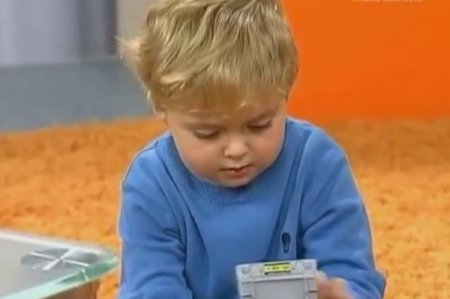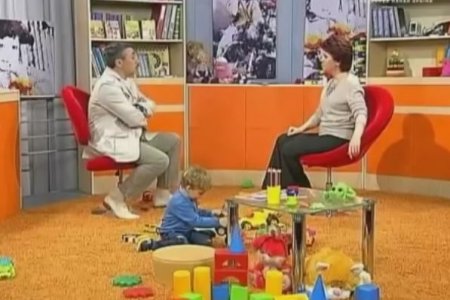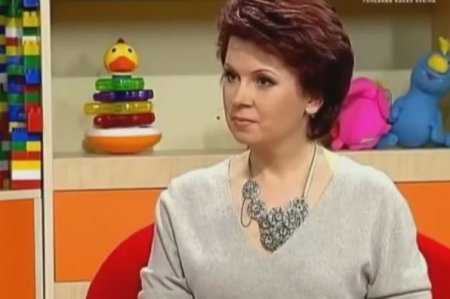Russia, Apatity
Darja Savonina from the town of Scarborough, we also visited the group from 5 months, but the child communicates with a narrow circle, does not like new places, does not trust strangers and does not want to play with many children - such a character. Is friends with only 2 children and 1 teacher. Tch here as lucky.
24/12/2012 16:02
UK, Scarborough
Strongly disagree with Yulia from Nizhnevartovsk. We in England have state-owned child care centers, where classes for children and mothers are held for babies of several months and for older children. By the way, Komarovsky would have liked it - a lot of activity, outdoor games, child safety is taken into account. And besides, everything is free.
We go to such classes since three months. Now my son is a year and a month and I have the opportunity to compare his development with children, whose mothers are more important, so that mother is next, and communication with peers is not needed. Our boy is contact, sociable, happily plays with his peers, and children who communicate only with his mother are simply afraid of others, and not only of their peers.
It seems to me that by limiting the child’s communication, you deprive him of an important part of social experience.
19/03/2012 18:41
Russia, Nizhnevartovsk
My 6 year old star loves to dance, but she is too lazy to overcome her, after kindergarten she can sit watching cartoons, says I don’t want to dance, I have to persuade her to start dressing, but after dancing she comes out cheerful and cheerful! ! In our case, it seems to me that sometimes it is worthwhile to make you overcome laziness and finally get ready for classes.
16/03/2012 09:24
Russia, Perm
By the way, there is a good friend who began to study music from the age of 12, later she finished both a music school, a pedagogical institute of higher education, and works in her specialty. There is a familiar boy who realized that he really wants to play the violin at the age of 13, his parents helped too, they found a teacher. I don’t know how his classes will end, he is still in school. His son took 3 months to developing when he was 1.5 years old. We liked it. Indeed, mother helps. Immediately there are friends with children - the same age as their children. When we moved to another area, I purposefully began to take my son into two sections at once. Now we don’t go to any of them (I didn’t want, I didn’t insist, 4 more years), but a lot of friends :)))
16/03/2012 09:18
Russia, Perm
Maybe music schools are different. Me and me like (a violin class, they actually take the piano later) were sent to a music school from the age of 4 and almost immediately "put on the instrument" (good fingers). And despite the fact that in the preparatory class we studied for 2 years, I finished the music school anyway earlier than a year than 9 classes of general education. Some of them finished 2 years earlier and studied for another 2 years individually in order to enroll in a music school. Honestly, it is not particularly useful. Classes developed a sense of beauty, fine motor skills, and there was always another team for communication and socialization training. Again, the street did not hang out.
15/03/2012 23:53
Ukraine, Novoaydar
She started driving her very active daughter to the preparatory class of the music school when she was 6 years old. It seemed to me then, "let the energy go in the right direction"))) But this preparatory class lasted three (!) Years. All this time we have not missed classes, she actively and sang in the choir, and something listened and responded to solfeggio, and worked with a teacher in the specialty (piano class). Now she is in the 4th grade of the school and only in the 2nd music school. And I thought, the music will go faster! Can we still torture the child? But walks something! Sings and plays!
15/03/2012 12:26
Belarus, Soligorsk
It is never too early to learn, and never too late. The main thing is that the child likes it and does not harm his health. Personally, I agree with the doctor. A child must have an active and active childhood, and he will have time to sit at a desk with books at school.
Life around is more and more like riding a bicycle: while you are pedaling, you are going. One has only to stop - you fall. To be in time, no matter what, you need to spin faster and faster. To achieve something in life, it is not enough to graduate from one institute, to become a candidate of science and get a lukewarm job. Today in fashion - to be successful. And this means knowing several languages (one English hasn’t surprised anyone for a long time, it’s not even a specialty, but an application to a specialty), you need to constantly improve your professional level, be sure to engage in at least some kind of sport and be a fully developed personality. In general, everything should be strictly according to Chekhov.
Every parent, no doubt, wishes the best for his child. He wants his baby to grow into a smart, beautiful and wealthy person. You can, of course, present all this to your offspring on a silver platter in the form of inheritance, shares, ready-made business and other things. But it is much more reasonable to teach a child to achieve what he wants. Remember, as in the famous parable, the old sage did not begin to catch the boy with fish, so that he would be satisfied, but allowed him to be near and learn to catch himself.
And in order to have time to teach your child everything that he may need in life, parents, before the birth of their baby, begin to form it. Future mothers attend courses where, in addition to preparing directly for childbirth, they are also involved in the intellectual development of the baby. It is very funny and touching to watch from the side, as mothers potted at five minutes to the music rattling rattles around the abdomen from different sides and at different tempos, apply colored sheets of paper to it, sing, beat off the rhythm on the stomach and do other stuff. I do not know whether this contributes to the birth of geniuses, but the mood from such exercises necessarily rises, which is also of great importance.
Immediately after birth, parents attend schools for dancing, singing and other various early childhood development courses with their children.
There are no straightforward statistics on whether purposeful exercises contribute to the development of outstanding abilities in a child. As a rule, children with whom they are actively and purposefully engaged in any system, just like their normal peers, begin to walk, talk, use the pot. Of course, a child can be taught to read, count, and in three - four years. However, in the next couple of years, all children in school are studying this.
However, responsible parents all the time feel anxiety and itching, looking at the peers of their children. This girl has been practicing figure skating and singing for the third year, the boy is engaged in gymnastics, drawing and something else, this is being brought to the Montessori group almost from birth, he already rides on mountain skiing, she does English five times a week. Children are recorded in some sports sections as soon as they are born. And now their inner voice begins to one parents to obsessively mumble that they are probably a bad mother and father, since they don’t develop a child, don’t put knowledge and skills into it, don’t take him from section to section, from circle to circle. What other children already know and are able to do, etc. etc.
Other parents, on the contrary, believe that the main thing is health, and all languages, drawing and sports schools can calmly wait. And do not overload the child - he should have a childhood with games, and not classes on a schedule, and the most necessary thing in childhood is a dream, a walk in the fresh air and proper nutrition.
As usual, each child’s developmental path has its pros and cons, but where are they more or less? Does it really benefit the child early development or vice versa discourages the child from further education. Let us recall the Nikitin family - their children did not want to follow in the footsteps of their parents in this matter.
The market offers a lot of education and children's development courses, and they are all crowded. But the quality of teaching in them varies greatly, and the price for them is often appointed high. The price does not always correspond to the quality, and it is also not clear whether this is necessary in principle. And to this question, each parent is looking for an answer on their own, since only he and no one else is responsible for their young child.
Morozova Elena Ivanovna - child psychologist, candidate of psychological sciences, art. Lecturer at the Department of Child and Adolescent Psychiatry, Psychotherapy and Medical Psychology of the Russian Academy of Medical Education. For her work on the psychological rehabilitation of victims of mass catastrophes, she was awarded the Award Cross “Defender of the Fatherland”, 2nd degree:
First, let's understand what is considered early development and what and how to teach. These are very significant points.
There are such cases in my practice, when they start learning as early as a year and a half - they hire a tutor, learn English, something else. In addition, the governess comes and also spends with the child special preparation for classes, i.e. doing lessons Although they are trying to teach in the form of a game, but it is still unacceptable.
At the age of one and a half years, the child must be developed, but in no case should this even be a preschool type of education, much less a schoolwork with teachers.
It is very good if the child with the mother visits various groups where you can sing songs, read the plays, where there is a rich playing environment, i.e. many different toys, objects aimed at the development of sensory sensations.
In Sweden, for example, the experience of the lekotek is very interesting, which mother visits with the child and where you can just play, and the specialist will show and tell you how best to do it. Useful, for example, the same Montessori group. In general, all development groups are useful, where the child has the opportunity to pass a lot of information through himself, learn new things, enrich his sensual experience and satisfy his curiosity. At the same time, the most important thing is for the development to take place in an interesting for him game form.
I really liked the example of such an “unobtrusive” development in Israel. Here comes a grandmother with a child for a walk, a butterfly flies by and a grandmother tells the baby about the butterfly in a form accessible to him, involves him in some butterfly game, etc. This is the development.
And when a child is tried in a year and a half to learn to distinguish between letters, colors, and they also ask him for the correct answers, this is completely unacceptable for a child.
Venger Alexander Leonidovich - child psychologist, Doctor of Psychology, professor at the Department of Psychology at Dubna International University and Department of Preschool Pedagogy and Psychology at the Moscow City Psychological and Pedagogical University (MGPPU). For his work on the psychological rehabilitation of the victims of mass catastrophes, he was awarded the II Degree Cross to the Defender of the Fatherland:
I am against the early learning of children to read, write and other "school" subjects. At preschool age, much more important tasks should be solved. Much more useful in this age to develop abilities. And for the development of abilities, the most important thing is the game, drawing, designing and other "preschool" activities.
I am also against early schooling. Russian schools are poorly adapted even for seven-year-olds, and they are not at all suitable for children of six years. Our legislation stipulates that a child can go to school from six and a half, from seven or from eight years of age, at the discretion of the parents. I recommend parents not to send their children to school before the age of seven, with the exception, perhaps, of rare cases, when a child is ahead of its age in terms of personal and emotional development. But I want to emphasize that it is personal and emotional, and not intellectual. And intellectually developed children, as a rule, on the contrary - lag behind their peers emotionally and personally.
Subject Submission:
The most important thing in any activities that adults organize for children is that they should like them. Often, adults think about whether they slightly load a child with physically daily workouts, then you need to understand that if a child periodically does not want to go to class, this load for him means a lot. Parents subconsciously believe that when they take a child to classes that develop intelligence, the child doesn’t really want it and needs to be forced to love it and master knowledge.



On an instinctive level, each woman compares her child with his peers, and when a child lags behind in some way, the woman becomes frightened for her cub. Dr. Komarovsky says that women should not focus too much on comparing their child with others; let development standards be assessed by professionals - doctors.
What skills parents need to develop in children in terms of instincts:
1. The ability to distinguish colors.
2. The ability to distinguish odors.
3. Distinguish form.
Dr. Komarovsky says that the most harmful in early development, when it occurs in a closed room on the carpet or not getting up from the sofa. The most dangerous for a modern child is the limitation of physical activity. But a huge number of parents prefer not active games on the air, but games with a computer, telephone and TV. The main thing in early development is that it should not interfere with health, because human happiness is determined by the level of health.

Postinor and its effectiveness in combination with alcohol
Carrier passenger traffic
How to deal with illegal taxis
What toys need a child in 2 years girl
How to monitor the air condition in the classrooms